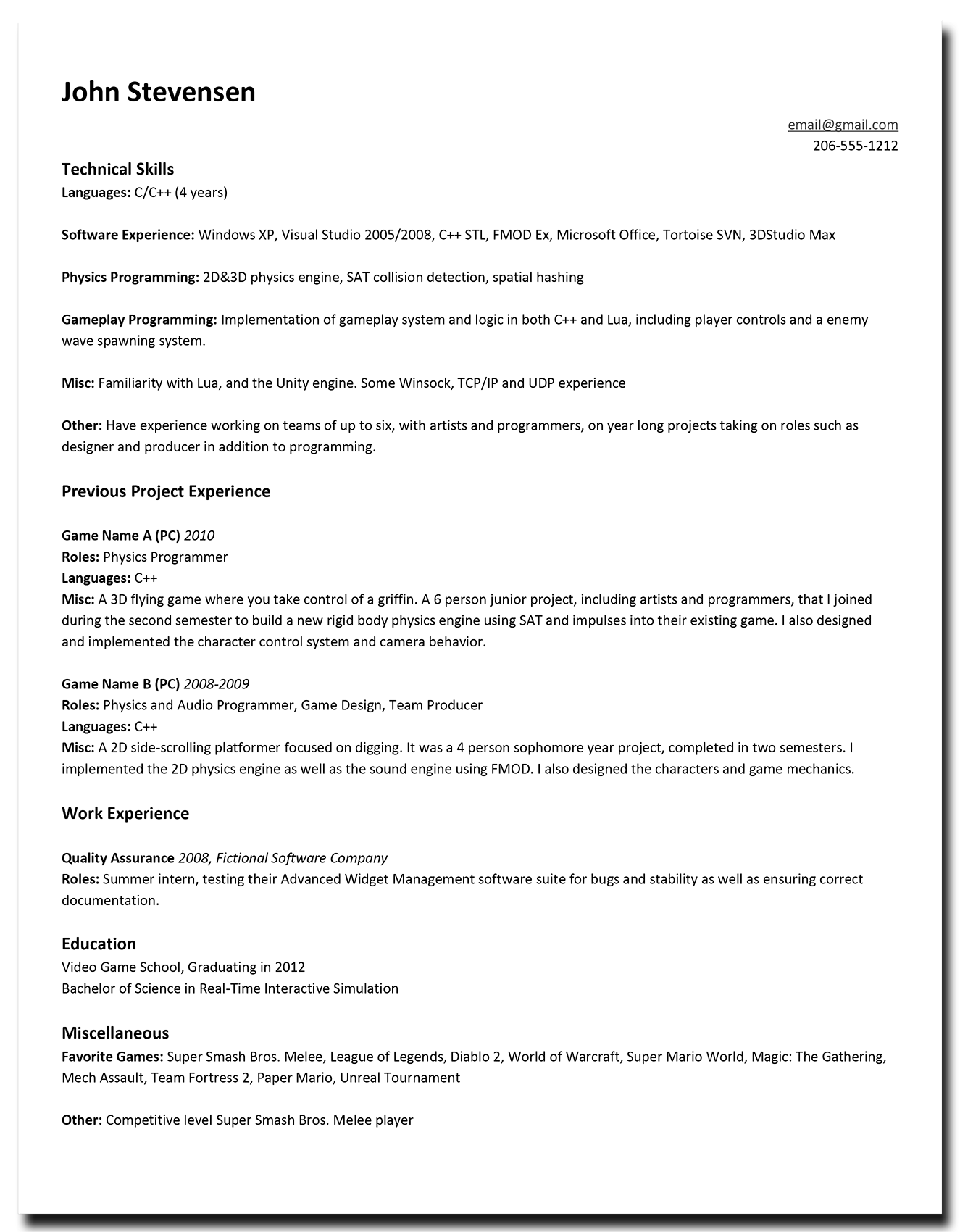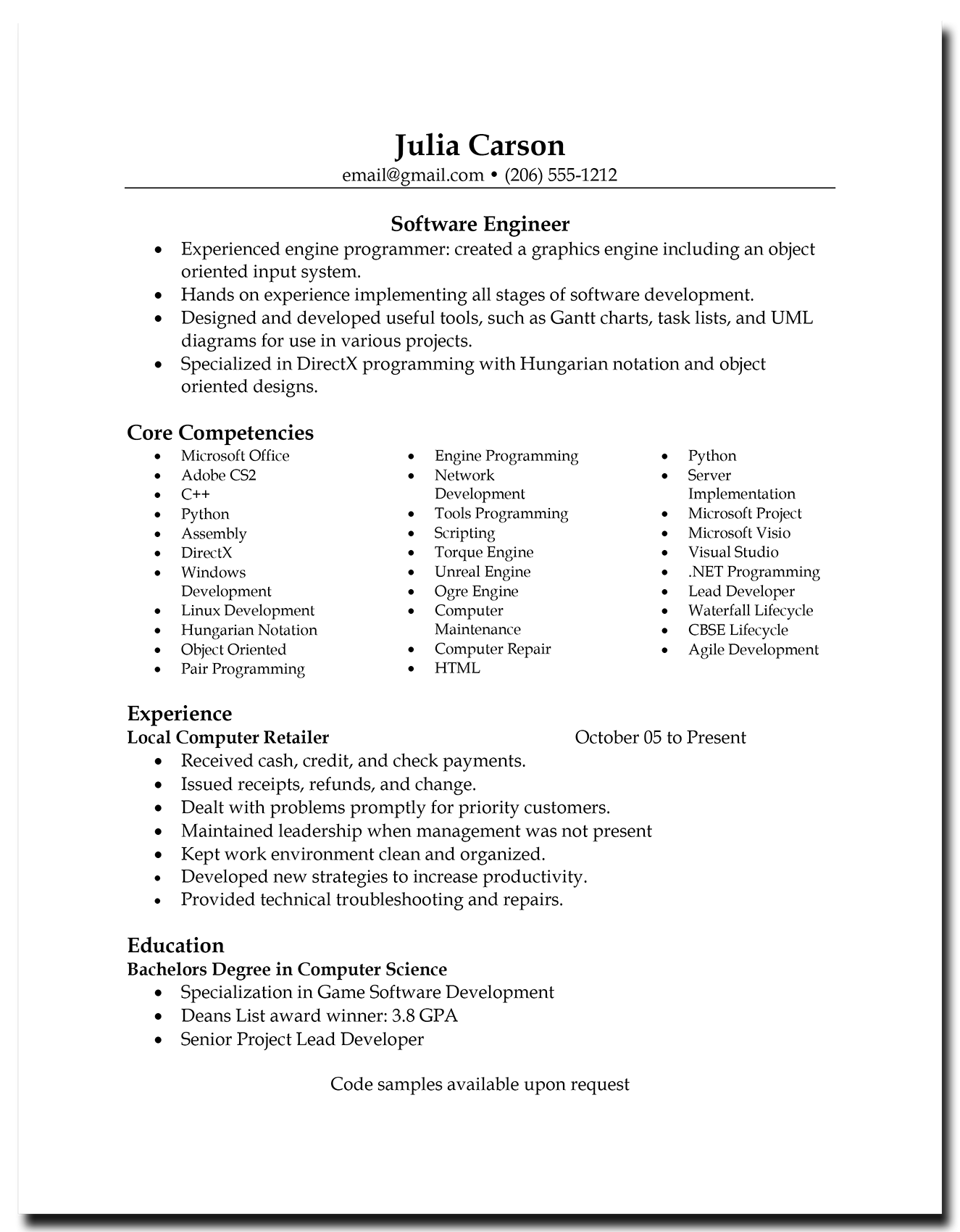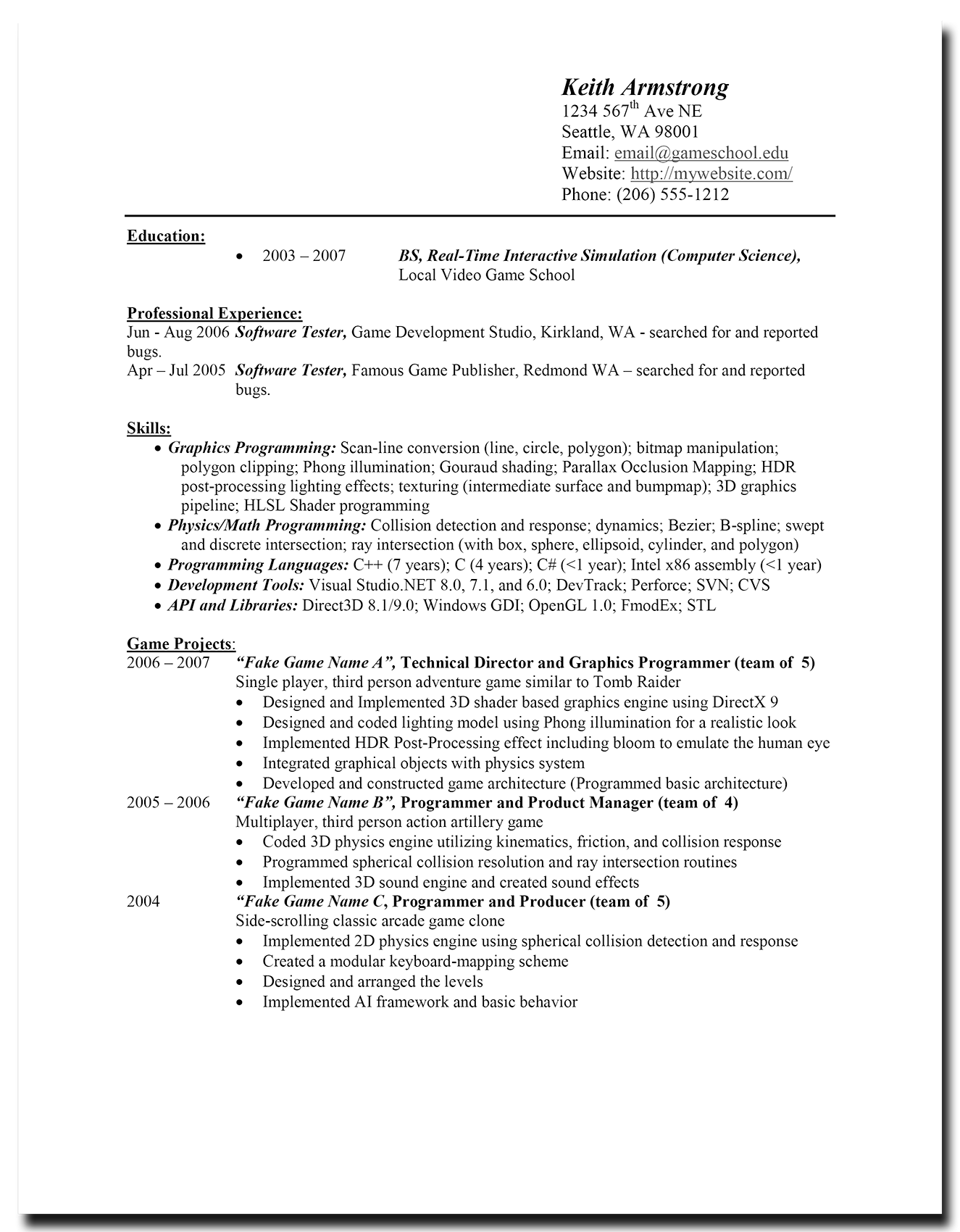Real Video Game Developer Resume Examples

When I applied for my first game studio job back in 2001, I knew that a good resume was important. Naturally I searched the Internet, hoping to find good advice and resume samples that worked. There wasn’t much out there back then. But what little I did find was conflicting and contradictory. Not helpful.
Functional or chronological? Combination or targeted? Formal or creative? MS Word or PDF? It shouldn’t have been so hard to get a straight answer.
That was a long time ago. Today, there’s 100 times more advice out there and it’s 1,000 times more conflicting and contradictory. Still not helpful!
Nothing speaks louder than an example that worked. So I dug through my archives to find actual resumes from people that applied while I was running the engineering department at a mid-sized game studio. They’re all very different in terms of layout, organization and styling, but they all have one important thing in common: They all got hired.
Let’s take a look and see what we can learn from these resumes that are – by definition – winners. I think we’ll see some surprising patterns that can get you hired, too.
(Note: I’ve changed the details of the names/genders, schools, games, and so on to protect the privacy of the applicants. But the layouts, overall structure and tone are intact.)
Game Developer Resume #1: Game student with broad tastes and diverse systems experience

Why did this game programmer resume catch my eye?
- It’s hard to find a candidate who’s good at programming systems as well as gameplay. This candidate has done both.
- He lists a fairly diverse batch of genres and scopes in his “favorite games” section. The studio I was hiring for had 12 teams all working on different types of games, so I wanted somebody who wouldn’t be a snob about what kinds of games they worked on.
- I gravitate toward coders that have experience in different roles on a team, such as designer and producer. It helps them see things from the viewpoint of the non-engineers on their team, which makes them a better communicator.
Game Developer Resume #2: Computer geek with leadership potential

What did I find intriguing about this engineering resume?
- I often look for candidates that could become lead programmers later in their career. This candidate was working at a retail store, and hints that leadership and customer support – two things that make for a great team lead – might be a strong suit.
- There are hints that the candidate might enjoy the process of planning software – UML, task lists, etc. – in addition to coding it. That’s a good sign for a potential project lead.
- I’m not thrilled with the giant “core competencies” section that lists every piece of software ever touched. I get it, it’s not for me. It’s for the search engines. But I don’t recommend it. It wastes a lot of space without helping me understand what makes the candidate special.
Game Developer Resume #3: Graphics specialist with strong 3D math chops

This is a really strong game developer resume.
- For starters, he has a degree from a game school and experience in QA on a professional game team. His time in QA will have given him insight into the game dev process, and shows he’s passionate enough to do a non-programming job if that’s what it takes to break in.
- Through all of his projects, he tackled complicated 3D-math-heavy features. That’s a good sign that he’s smart and motivated. Also, a surprising number of game programmers aren’t great with 3D math, so it’s always handy to have a ringer on the team.
- He’s heavy on graphics experience. At the time, the studio I was hiring for was low on good graphics programmers. He’s applied at the right place at the right time.
What do these resumes have in common?
These game developer resumes are very different. And in reality, the candidates went on to have very different career paths, each built around their individual strengths and interests. So at first it might seem there’s not a lot you can learn by studying them.
But from a higher-level view, they actually have a lot in common.
- They all have a degree from a video game school. That’s not a requirement, but it helped me feel more confident that they know what they’re doing.
- They all have experience working on real projects with real teams. Even if it’s just part of their schooling, it’s important to show they have the social and team skills to work under a deadline – without killing themselves or their teammates.
- They all have qualities that I was specifically looking for, for my specific studio and teams. It might seem that it’s hard to know what a hiring manager is looking for. But you can always do a little research to find out what a studio needs, then orient your resume to highlight that portion of your skill set.
What can we learn from game developer resumes?
Those are the similarities. But maybe there’s something to learn from the differences? Sure, they all have completely different layouts and formatting. But they all get their point across. They show who they are, and what they can do.
And they all got hired.
So the real lesson might be this: The layout of your resume isn’t as important as everyone wants you to think. It’s the content that counts, not the tabs, fonts and margins. Fonts don’t get you hired! Being awesome gets you hired. Show them who you are, why you’re great, and why they should hire you. Get that part right, and nothing else matters.
If this article was helpful, please help me out and share it on social media.
Image: Just2shutter/freedigitalphotos.net
Read my new book!
Making games for a living is an incredibly rewarding career, but it’s hard to break in unless you have insider knowledge. This book levels the playing field.


oh great and helpful post
Glad we could help out, Sara. Check back often for new content!
Super helpful! This site rules.
Right on! Thanks for stopping by, Patrik. Let me know if there’s anything else you could use some help with.
I don’t have a degree or any graphics skills and I live in Jamaica I’m deferring my subjects for next year and I thought 🤔 I could be a game tester and earn money to help my mother but it looks like only people who have skills can do it but I like games and know how to spot out glitches in it and more but I don’t have the skills to do it
Hi Steven, most game tester jobs are entry-level positions that don’t have any specific requirements. Check out the game tester frequently-asked questions page.
Hello, I’m looking for a good CV tamplate for a game tester job but I don’t find any on the web. I want to be a game designer but I don’t have any videogame related qualification yet. Can you help me?
I don’t have any good examples of a QA resume right now, but I’ll try to find some and then make a post about it!
Thank you it’s a big help for me 🙂
I just wanted to comment that this was really useful information! However, I am kind of curious as to where someone would put modding experience? I though maybe under Professional, but if you are modding games -more specifically solo- then it seems it might defeat the purpose?
It’s okay that it’s not “professional” experience – you’re still learning the tools and practicing your game design skills, and you still have something to show for it. I wouldn’t put it under a heading called “Professional,” but maybe put it under a heading called “Projects.”
Cool.Do you know if a minor or art would help get mme hired (for game designer)
Minor in art. Not minor or art
I have a lot to learn.
I’m sure this may be due to them mostly being students, but I noticed no actual “job” history on most of these. What if I’ve had several jobs that aren’t relevant to the field? Should those still be included, or should managers simply be part of references?
Hi Cat, actually all 3 resumes do have some jobs listed, maybe it’s not obvious since I “fictionalized” the company names to hide the identity of the people that own the resumes. #1 had a previous job as a software tester, #2 worked at a retail computer store, and #3 had two different software tester jobs.
You’ll want to list 1 or 2 jobs in your history, even if they aren’t relevant. The reason for this is to 1) show that you have some experience working at a company, 2) can hold down a job and 3) hopefully you can spin the jobs into seeming relevant – for example your past jobs might have given you the chance to “work well unsupervised” or “listen and respond to the needs of customers.” See what I mean?
I am in my senior year of college majoring in Video Game Design. I have worked as a Video Editor at the School of Excellence. I am also interested in Game Tester Jobs as well. I create my own Anime Videos and am very good with matching music to Videos. That also interest me. I would love some helpful hints as far as moving forward so I know what direction to lean when I graduate in two more semesters. Thank you so much for any assistance you can offer.
Hi Anthony, since you’re majoring in game design, I would expect you’ll be able to get a job as a Game Designer! Build up your design portfolio as much as you can while you’re in school so you can show employers your skills, and then you can start applying for game design jobs a few months before you graduate.
While I find your article much amusing, it doesn’t help my condition; that guy that has no experience nor college degree, but has the passion, ideas, and concept for a game. What would you suggest I do, noting that going to a school is out of the question since I can’t fund it?
Damn I sound like I’m describing a Hard-mode level =|
If you don’t have experience, but do have the “passion, ideas, and concept” then get that experience! Make something!
There are lots of free tools for getting your feet wet working with games. GameMaker can be a nice tool if you have no experience and I’m sure google could turn up lots of even better resources.
Take your ideas from concept to reality to show what you can do, good luck!
Exactly the advice I was about to give. 🙂
Check out these free tools for making your first game: http://www.gameindustrycareerguide.com/make-your-first-video-game-today-using-these-free-tools/
You could always just show up with a briefcase full of porn you drew…
Hah! Kris. Well it certainly worked for you, my man – maybe it could work for somebody else too. We’ll consider that the hidden “secret level” of resumes. 😉
Hello! I am a high school student and from what I see here, a resume to work in the game industry is very different from the usual resume but, what I want to know is that, would a traditional resume work as well? I’m very passionate about video games but, I’m not sure how I would prepare for the video game industry.
Hi Raena, there isn’t a “standard” resume – there are many different ways you can do a resume. The important thing is to make sure your resume shows your work history, education, and experience in a clear way so hiring managers can easily see whether you might fit the job. The way to prepare for the game industry is very different depending on which job you’re interested in, so I recommend you start with the video game careers page and see if one of those might be a good fit for you.
Hi Jason,
I am a student currently on a placement in my 3rd year of University. I want to get a financial role in a gaming company. Something analytical preferably and I was wondering what sort of way I should go about it.
I am trying to find a placement in a gaming company and I was wondering if you had any advice.
I’ve also tried to connect on Linkedin
Thanks
Smaller game companies may not have dedicated roles for Finance people, but larger game companies and game publishers sometimes have small to mid-sized finance groups. You might start by targeting larger companies like EA, Nintendo, Amazon, Microsoft.
Hi,
What would you recommend to someone who wants to be hired in the game dev industry but has no development skills, but can offer years of experience in e.g. marketing? How do you approach tweaking your resume for these posts?
David
Hi David, I’ll always recommend looking for game jobs that have as much overlap as possible with your existing skill set. In your case, with a marketing background, there are a couple jobs that come to mind. The first is to work as a marketer in the game industry — many game publishers have a marketing staff. The other, is as a product manager — many game studios and publishers, particularly for free-to-play games, hire a staff of product managers that have marketing skills. So take a look at some related job postings and see if either of those might be a fit.
Hi Jason,
The Article was great. I am currently working in a whole different field for 2.5 years. My current job has nothing in common to Game testing & programming. But when I came to know about, I’m very interested. I have learned C++ earlier and have worked in MS Excel. What are chances of me being ending up with a career in Game Testing?
Hi Abraham, many game testing jobs are “entry level,” meaning that they don’t require any previous experience testing games. If you apply for game tester jobs, you may have an advantage because you have a couple years’ experience working in a professional job. Try applying for some testing jobs, you might be surprised!
Hi Jason, I Found this article very helpful and gave me lots of information. I Was wondering how to get some experience of game testing maybe some beta games you can do at home for free? I never took classes about programming or using Microsoft Excel but i do now to work Microsoft excel. Any advice on how to start my resume there’s a job I’d like to apply for but i wanna make sure i am prepared
Hi Jeremy, since you already have a job you want to apply for, I recommend looking at the “requirements” section of the job posting to see if you already have (or can quickly get) experience to match their requirements. Most entry-level testing jobs won’t require much (if any) previous testing experience, so you might already have everything you need to apply for the job.
Hi Jason, thanks for this helpful article! I am a soon-to-be college grad so this article definitely made me a lot more comfortable in writing a professional-level resume. Right now, I am looking for an internship as an audio music production assistant/sound designer and I saw that one of the resume included a “miscellaneous” section listing the writer’s favorite games. I felt that this is very helpful in presenting someone’s personality but I’m also hesitant to including it, since I’m not sure if this is a common approach in the video game industry. Any advice in this part of the resume? Thanks in advance!
Hi Al, there are lots of ways you could let your personality show through — some people list a few hobbies, or volunteer work, whatever you’re comfortable with. But whether you add it or leave it out, it’s extremely unlikely to “make or break” your job application, and there’s no common/standard in the game industry. So just go with what feels right for you.
Hello Jason, I have often been struggling to get my foot in the door in the gaming industry. I have applied to many QA testing jobs (especially Activision) while mentioning some experience of computer programming, Microsoft applications, art development using Adobe apps and Maya and of course, my passion for gaming. However, I still have had no luck in getting a job as a QA tester despite it being an entry level position. Would you be able to tell me what makes an ideal applicant for a QA tester?
Hi Ricky, you should start by thinking about which step in the job process is causing the problem. Are you applying for jobs but then the companies don’t respond? Then it could be that your resume needs improvement, or it could be that you need to try applying to different companies (maybe companies that are closer to your current home, or smaller companies that aren’t as well-known as Activision). Or, are the companies calling you for job interviews but then they don’t give you a job offer? Then you may need to improve your interviewing skills, maybe you need to practice at home with a friend or family member to improve your interviewing skills. Here’s a podcast to prepare for your interview, and here are some tips to interview at a game company.
Do you have a word file of the resume for easy editing? If so, please post some here because it would a great help.
Hi Yababa, I don’t have the original files anymore, but you shouldn’t worry about using the exact template — the templates that come with most editing software like Microsoft Word or Pages are also really good.
Hello Im a high school freshmen and I really just don’t know where to start Im currently still learning the algorithms and basic knowledge about the requirements of what is needed to become a Game developer. Im trying to pursue programing. Is there any advice or recommendations, and what classes I should take in the future for college that would help?
Hi Anthony, it would be helpful to take programming classes in high school if your school offers them. You can also download a free game engine like Unity 3D, and work through some of their free tutorials. Check out my article on how to learn game programming in high school.
I just bought and read your book on how to get a job as a tester. You included links in the books for examples of cover letters and resumes for QA jobs. These both seem to be invalid links. Is there somewhere to find these elsewhere, or were they just fabrications?
Hi Royale, thanks for reading the book! I hope you found a ton of useful information on becoming a game tester. I just checked the links you mentioned, and I think you’re right – I intended to write those articles but they’re still on my to-do list. Please accept my apologies! Until I can publish those articles, here are some resources that will help you out: 1) Watch this video of a game tester resume breakdown on my YouTube channel. 2) You’ve already read the above article – the examples aren’t for QA, but the same principles apply to all resumes in the game industry. 3) There are a lot of *terrible* cover letter examples online, but I found this one that seems like a good starting point for you. I hope that helps!
Don’t know if this is this appropriate place to ask this question but I’ll give it a shot. My grandson, 22 yrs. old is an avid gamer and just received his bachelor’s degree in audio coding, gaming, etc. (I think that’s it) from Texas U at Austin. He is a math wizard and very intelligent, and knows gaming inside out, however, he has a communication disability that makes him very shy around people – just enough that folks know he’s different. Should he mention that in his resume or hold off until a possible interview? I’m forwarding your website to him as it’s the best and most comprehensive I’ve been able to see in his area of interest. He’s in need of a push to get started.
Hi Grandma JB, congratulations to your grandson on earning his bachelor’s degree! The game industry is very neurodiverse. I don’t think it’s necessary (or helpful) to mention something like that on a resume or during an interview. It’s up to the hiring manager (and interviewers) to determine whether an applicant can do the job adequately, and they will likely care much more about your grandson’s programming ability than in his shyness. That said, interviewing is itself a skill – if he’s quite shy, he may need some coaching and practice to get good at interviewing. If you suspect that’s the case, I recommend contacting the career/placement staff at Texas U to see if they can offer/recommend some coaching for him. I wish you and your grandson the best!
Thank you so much, Jason! I feel a bit better now. I sent him your book and gave him your website info etc. Now, it’s fingers crossed for a foot in the door. Thanks again for taking the time to respond.
You can use something similar, in my opinion. I may be a bit shorter in the cover letter… It must be as much about them as it is about you. The resume, at least in the summary section, is all about you.
Hi Jason,
I see that this decade old article actually never got old. Thanks for writing such a helpful article.
I would like to ask whether number of pages in resume matters or not? All above resumes seems to be only one pagers. Also, another question in my mind is–
I worked as a pharmacist for 5 years and then switched to game development (what i was aspiring for almost a decade). I don’t have any bachelor’s degree but now I do have experience of working at a gaming startup for 1 year and additional experience of freelancing. Shall I mention pharmacy experience and pharmacy diploma on my resume for my job applications or it shall be avoided?
Hi Gurbrinder, great questions. 1) Shorter is better. Unless you have a decades-long career in games, you should try to fit everything on 1, maybe 2 pages. 2) Yes, it’s worth mentioning your pharmacy diploma and pharmacy experience, but you don’t need to go into detail about it. It’s worth mentioning because it tells potential employers that you have the smarts and dedication to complete a degree, and that you have experience working in a professional environment. Best wishes for your job search!